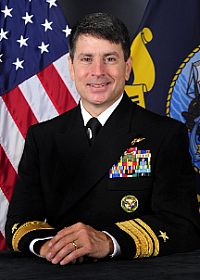Witness | US v Pfc. Manning, Rear Admiral Kevin Donegan, CENTCOM, Director of Operations
- posted March 16, 2012
UPDATE POST COURT-MARTIAL
United States v. Pfc. Manning was conducted in de facto secrecy. The public was not granted contemporaneous access to court filings or rulings during her trial. In addition to reporting on her trial, I transcribed the proceedings, reconstructed the censored appellate list, and un-redacted any publicly available documentation, in order to foster public comprehension of her unprecedented trial.
As a result of a lawsuit against the military judge and the Military District of Washington brought by the Center for Constitutional Rights, as well as my own FOIA requests and research, an official court record for US v. Pfc. Manning was released seven months after her trial. That record is not complete.
The official trial docket is published HERE and the entire collection of documents is text searchable at usvmanning.org.
*During the pretrial proceedings, court-martial and sentencing of Pfc. Manning, Chelsea requested to be identified as Bradley and addressed using the male pronoun. In a letter embargoed for August 22, 2013 Chelsea proclaimed that she is female and wished to be addressed from that moment forward as Chelsea E. Manning.

Rear Admiral Kevin Donegan, Director of Operations, CENTCOM
General Description:
Rear Admiral Kevin Donegan, USCENTCOM, Director of Operations is the Original Classification Authority, who conducted classification reviews for two PowerPoint (PPT) slide presentations of official reports originated by USCENTCOM, and their impact on national security due to the release of the information.
The PowerPoint (PPT) presentations relate to Farah Province, Afghanistan, and Specification 10, or Charge II, or Article 134.
The defense argued that Rear Admiral Kevin Donegan, USCENTCOM, Director of Operations, was an “essential witness” for the Article 32 Pretrial Hearing.
The Investigating Officer, Lt. Col. Paul Almanza, ruled that Rear Admiral Kevin Donegan, USCENTCOM, Director of Operations, was “not reasonably available” for the Article 32 Pretrial Hearing.
Judge Lind agreed with Lt. Col. Paul Almzana’s ruling, saying that Almanza’s ruling was not “improper”.
Judge Lind ruled against defense’s motion for depositions, saying that affidavits can be considered sworn statements.
Other Information:
Article 32 Witness List Number 40 on the Defense Request for Article 32 Witnesses, December 2, 2011
XXXXXXXXXX [REAR ADMIRAL KEVIN DONEGAN, USCENTCOM, DIRECTOR OF OPERATIONS] conducted classification review on two PowerPoint slide presentations of official reports originated by UNCENTCOM. The PowerPoint presentations are XXXXXXXXXXXXXXXXXXXXXXXXXXXXXX [ARE THE SUBJECT OF SPECIFICATION10 OF CHARGE II]
See March 16, 2011 Motion Hearing Transcript for name disclosure. “Rear Admiral Kevin Donegan, USCENTCOM, Director of Operations. Conducted classification review of two PowerPoint (PPT) Official Reports from CENTCOM related to Spec 10, Charge 2 and their impact on national security.”
See Defense Deposition Request, January 12, 2012 for redaction of “are the subject of Specification 10 of Charge II.” David Coombs uses redundant phrasing in multiple documents.
Charge 2, Spec 10 is 11 Apr 2010 and 27 May 2010 UNAUTHORIZED POSSESSION AND TRANSMIT MORE THAN FIVE CLASSIFIED RECORDS RELATING TO FARAH PROVINCE, AFGHANISTAN] (SPEC 10, Article 134). See March 1, 2011 Charge Sheet.
Defense Deposition Request, January 12, 2012
b. XXXXXXXXXXXXXXXXXXXXXXXX [REAR ADMIRAL KEVIN DONEGAN, USCENTCOM, DIRECTOR OF OPERATIONS]. XXXXXXXXXX [REAR ADMIRAL KEVIN DONEGAN, USCENTCOM, DIRECTOR OF OPERATIONS] conducted classification reviews on two PowerPoint slide presentations of official reports originated by USCENTCOM. The PowerPoint presentations are the subject of Specification 10 of Charge II. XXXXXXXXXX [REAR ADMIRAL KEVIN DONEGAN, USCENTCOM, DIRECTOR OF OPERATIONS]will testify regarding his classification determination and his belief of the impact on national security due to the release of the information. The requested deposition is needed due to the Article 32 Investigation Officer’s improper determination that XXXXXXXXXX [REAR ADMIRAL KEVIN DONEGAN, USCENTCOM, DIRECTOR OF OPERATIONS] was not reasonably available at the Article 32 hearing. XXXXXXXXXX [REAR ADMIRAL KEVIN DONEGAN, USCENTCOM, DIRECTOR OF OPERATIONS] was an essential witness and should have been produced in person at the Article 32 hearing. Additionally, govern the classified nature of his testimony, the government needs to arrange for a proper location for the deposition. The defense request that an oral deposition be conducted.
Motion Hearing Transcript, March 16, 2012
Judge Lind: Defense Moves to Compel Deposition…
Judge Lind reads her ruling which is broken down into sections that explain the motion, the defense argument, and her ruling. Judge Lind reads very quickly and so I could not type out every word or sentence that she said. Here is what I captured:
Defense has asked for the oral deposition of the following individuals:
…
Rear Admiral Kevin Donegan, USCENTCOM, Director of Operations. Conducted classification review of two PowerPoint (PPT) Official Reports from CENTCOM related to Spec 10, Charge II and their impact on national security.
…
The Judge continues reading background information in her ruling.
…
Judge Lind then reads the lists of charges.
Lind reads excerpts from the Article 32 Pretrial Investigating Officers previously unavailable rulings on Defense’s Witness List [See Number 40] and Motion to Compel Witnesses from the Article 32 Pretrial Hearing.
…
Lind then cites the Pretrial Investigating Officer’s ruling that Rear Admiral Kevin Donegan, USCENTCOM, Director of Operations was not reasonably available.
…
Judge concludes by denying Defense Motion to Compel Depositions.
Lind rules that the Investigating Officer’s determination of the witnesses reasonable availability in Article 32 Pretrial was not Improper, as the defense had argued.
Lind says she bases her own ruling on the Pretrial Article 32 rules in that the Investigating Officer, Paul Almanza, performed the “correct balance test, depositions only allowed in cases used to preserve essential testimony.”
Lind says that affidavits can be considered sworn statements under Section 28, 1746.
Judge Lind continues:
Government had offered OCA by telephonic…Defense disputes 2E applies…Article 9, R.C.M. 702…in the interest of justice the motion is denied.
Other Resources: